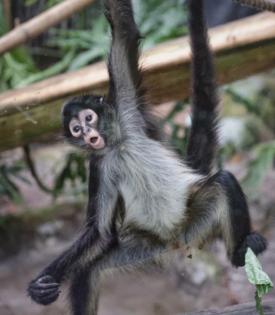Man sentenced for illegally trafficking baby spider monkeys across US-Mexico border
Published in News & Features
SAN DIEGO — A 33-year-old Texas man was sentenced in San Diego federal court Friday for coordinating the smuggling of at least six protected baby Mexican spider monkeys through the Calexico Port of Entry, prosecutors said.
U.S. District Judge Robert Huie ordered Sarmad Ghaled Dafar, who pleaded guilty to a conspiracy charge, to serve four months in custody and 180 days of home confinement. He was also ordered to pay about $23,500 in restitution for the cost of quarantining three of the monkeys at the San Diego Zoo.
According to investigators, Dafar helped coordinate the purchase and smuggling of the monkeys across the border on three occasions between June 2022 and August 2023.
The crime was first discovered by U.S. Fish and Wildlife Service officials when they stopped one of Dafar’s co-conspirators attempting to get three baby monkeys across the U.S.-Mexico border into the U.S., prosecutors said.
The Fish and Wildlife investigators searched the co-conspirators and found messages from Dafar organizing the shipment of the three monkeys, as well as at least three other monkeys from Mexico into the U.S. in June 2022 and July 2023. The fate of those monkeys remains unclear.
Dafar said in Facebook messages that smuggling babies was easier because the adult monkeys make noise and are active, while the younger ones sleep and hide, prosecutors said.
Photos Dafar sent in messages to potential customers showed baby monkeys under heat lamps and hugging a stuffed animal in small cages, which showed he understood the animals had been prematurely separated from their mother, investigators said.
“(I’ll) let you know when it is here because they gonna send it to me from California,” one of the messages to a client read. He added in the messages with the potential customer that the monkeys normally go for $15,000, but he was selling his for $8,000.
Animal experts in the case testified that Mexican spider monkey mothers will not voluntarily give up their babies, and the entire troop of spider monkeys will try to defend the mother and baby, prosecutors said. The babies typically nurse for their first year and stay close to their mothers for about four years.
Poachers will typically kill or incapacitate the mothers to capture the babies.
“This crime ripped weeks-old baby monkeys from their mothers, disrupted fragile ecosystems, endangered a vulnerable species, and posed significant public health risks,” said U.S. Attorney Adam Gordon. “This is not merely an economic crime; it is a severe and lasting injury to both wildlife and public safety.”
The baby monkeys were taken to the San Diego Zoo, where keepers determined they had three different mothers, officials said. They were quarantined, due to potentially dangerous zoonotic diseases, before they were transferred to a troop of fellow spider monkeys at the Brookfield Zoo in Chicago.
©2025 The San Diego Union-Tribune. Visit sandiegouniontribune.com. Distributed by Tribune Content Agency, LLC.







Comments